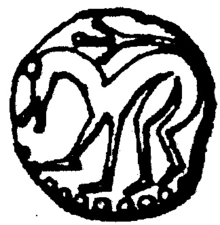Aldfrith
| Aldfrith | |
|---|---|
| King of Northumbria | |

The lion symbol used on Aldfrith's coinage
|
|
| Reign | 685–704/705 |
| Predecessor | Ecgfrith |
| Successor | Disputed between Osred and Eadwulf |
| Died | 14 December 704/705 Driffield, East Riding of Yorkshire |
| Consort | Cuthburh |
| Issue |
Osred Osric? Offa Osana? |
| Father | Oswiu |
| Mother | Fín |
Aldfrith (Early Modern Irish: Flann Fína mac Ossu; Latin: Aldfrid, Aldfridus; died 14 December 704 or 705) was king of Northumbria from 685 until his death. He is described by early writers such as Bede, Alcuin and Stephen of Ripon as a man of great learning. Some of his works and some letters written to him survive. His reign was relatively peaceful, marred only by disputes with Bishop Wilfrid, a major figure in the early Northumbrian church.
Aldfrith was born on an uncertain date to Oswiu of Northumbria and an Irish princess named Fín. Oswiu later became King of Northumbria; he died in 670 and was succeeded by his son Ecgfrith. Aldfrith was educated for a career in the church and became a scholar. However, in 685, when Ecgfrith was killed at the battle of Nechtansmere, Aldfrith was recalled to Northumbria, reportedly from the Hebridean island of Iona, and became king.
In his early-8th-century account of Aldfrith's reign, Bede states that he "ably restored the shattered fortunes of the kingdom, though within smaller boundaries". His reign saw the creation of works of Hiberno-Saxon art such as the Lindisfarne Gospels and the Codex Amiatinus, and is often seen as the start of Northumbria's golden age.
By the year 600, most of what is now England had been conquered by invaders from the continent, including Angles, Saxons, and Jutes. Bernicia and Deira, the two Anglo-Saxon kingdoms in the north of England, were first united under a single ruler in about 605 when Æthelfrith, king of Bernicia, extended his rule over Deira. Over the course of the 7th century, the two kingdoms were sometimes ruled by a single king, and sometimes separately. The combined kingdom became known as the kingdom of Northumbria: it stretched from the River Humber in the south to the River Forth in the north.
...
Wikipedia
